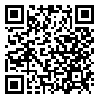

BibTeX | RIS | EndNote | Medlars | ProCite | Reference Manager | RefWorks
Send citation to:
URL: http://jdisabilstud.org/article-1-2195-en.html
2- Assistant Professor, Department of Accounting, Sari Branch, Islamic Azad University, Sari, Iran
3- Associate Professor, Faculty Member, Department of Accounting, Semnan Branch, Islamic Azad University, Semnan, Iran
Abstract
Background & Objectives: People employ an internal process to make decisions, a decision–making style. Attribution is the process people use to link events and behaviors to their underlying factors. When humans fail at something, they attribute that failure to reasons and justify it over the lack of control. Optimistic people attribute failure to external, unstable, and other reasons. Dedicated and pessimistic people attribute the cause of failure to inner, stable, and general attributes. In auditing, the effect of these characteristics on judgment, decision–making, and the type of auditor's report and its impact on the decisions of clients of auditor services is essential. So, this study investigated the relationship between attributional styles and the inability to make decisions in auditors working in audit firms and the audit organization.
Methods: The current research was applied in terms of purpose and descriptive correlational in terms of method. The statistical population included all auditors working in auditing firms and the auditing organization in 2019. Using the available sampling method, 310 auditors were selected as a study sample. The measurement tools were the Attributional Style Questionnaire (Peterson et al., 1982) and the General Decision–Making Styles Questionnaire (Scott & Bruce, 1995). Data analysis was done using descriptive statistics (mean and standard deviation) and inferential statistics (the Pearson correlation coefficient) in SPSS version 22.
Results: The results showed a negative and significant relationship between the subscales of decision–making inability and attributional styles in the subscales of stability/instability (positive), internal/external (negative), stability/instability (negative), and general/specific (negative) (p <0.01). The highest correlation coefficients were between rational decision–making style and internal/external subscale (negative) (–0.868) and between intuitive decision–making and general/specific subscale (–0.848). There was a positive and significant relationship between the subscales of inability to make decisions and attributional styles in the internal/external (positive) and general/specific (positive) subscales (p<0.01).
Conclusion: Based on the current research findings, there is a significant relationship between attribution styles and the inability to make decisions. It seems necessary to empower decision–making and proper thinking to reduce auditors' problems.
| Rights and permissions | |
 |
This work is licensed under a Creative Commons Attribution-NonCommercial 4.0 International License. |


